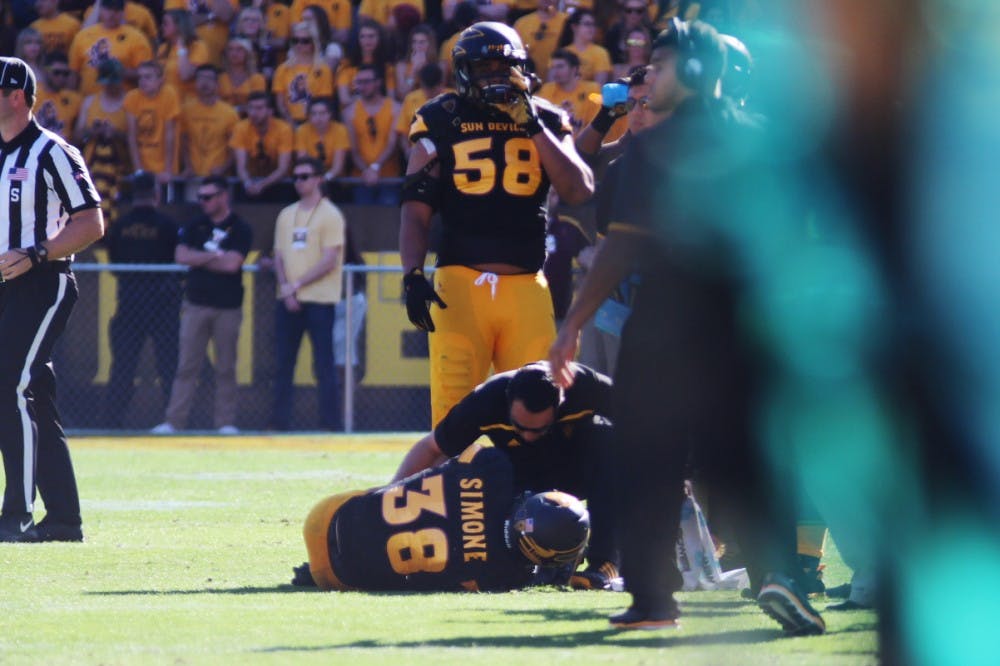College football players at ASU need better health care because of the inherent danger of playing the sport, including long-term health risks.
Over 250,000 NCAA injuries were estimated between 2014 and 2019. Long-term health is also a factor, as a growing field of research has proved that college football players "suffer more brain-related issues as they age."
As the world saw on Jan. 2, Buffalo Bills safety Damar Hamlin suffered a cardiac arrest on the field. It was a terrifying moment that, unfortunately, fits into the larger context of the extreme danger that comes with playing football.
Given these inherent risks, college football players at ASU and around the United States need high-quality health care and health insurance for the short and long-term.
Under NCAA rules, athletes are required to have a basic health and accident plan. Most Division I universities provide this basic care, but they are not required to. Depending on their insurance coverage, players can be subject to significant out-of-pocket expenses.
There are two health and accident plans provided by the NCAA: the catastrophic injury insurance program and the Exceptional Student-Athlete Disability Insurance Program.
The catastrophic injury insurance program operates at a deductible of $90,000, meaning it only kicks in once $90,000 has been paid through different coverage. However, an important limitation of the program is that an athlete can only use it if they report their injury within two years.
Athletes that learn of their injuries later in life would be excluded from the policy. This is especially true of the long-term effects of concussions, such as chronic traumatic encephalopathy and Alzheimer's disease.
The Exceptional Student-Athlete Disability Program provides high-profile athletes with insurance in case they suffer a career-ending injury. However, like the other programs, it has limitations. Players have to prove that they will have high professional draft stock, in a rather ambiguous process, and they also have to pay high premiums if the program is enacted.
Disability coverage goes into effect if an athlete is disabled playing their sport. But, if they were able to work a full-time job after their injury, insurance benefits can be cut to zero. That's just for the full disability benefits, too; the partial disability benefits can be cut even more because it is assumed that the athlete can still work in some capacity.
The insurance programs that are provided to college football players are inadequate. This is especially the case given the nature of long-term injuries, particularly head injuries, that are inherent to the sport. ASU should go out of its way to ensure that long-term coverage is provided to all Sun Devil athletes if they need it, even outside of the time that the athlete plays for the team.
"All schools can always provide additional insurance coverage," said Aaron Hernandez, the director of the Sports Law and Business Program at the Sandra Day O'Connor College of Law.
Outside of ASU and the NCAA, the Pac-12 Conference helps provide for athletes who need coverage after their college athlete career is over.
"Specifically, for ASU players … four years post-separation, Pac-12 athletes are still covered for injuries and medical associated expenses that come from athletics," Hernandez said.
Yet, like the other programs, it does not cover long-term injuries after those four years, and it can be hard to prove that injuries did occur when taking part in athletics.
It is true that the benefits described are better than what most people in the U.S. receive. But, it's also true that the bar for health insurance in the U.S. is incredibly low. According to a study done by The Commonwealth Fund in 2021, the U.S. ranked last in a study of 11 high-income nations about each country’s health care system. The difference? All of the other countries had some form of universal health care.
This phenomenon is not separate from the insurance that college football players receive in the U.S. In fact, it is inextricably linked to it. Athletes have to deal with higher education's convoluted, inadequate health care system because it's part of the broader flawed U.S. system.
Just like for every other working person in the U.S., a good portion of health care for college football players is tied to their employment — even though they aren't legally classified as employees (yet).
It is an unfair system that prioritizes money over human life, and in the case of a dangerous sport such as college football, the need for life-affirming health care could not be more prevalent.
ASU should provide better care to its athletes who generate millions of dollars in revenue, and its athletes and the general public should demand a health care system that allows people to live freely and healthily instead of being trapped and beaten down.
Clarification: The headline of this column was updated to better reflect the content of the piece that is analyzing NCAA health insurance plans offered to college athletes. The column was updated on Jan. 24, 2023, at 6 p.m. to reflect the change.
Edited by Piper Hansen, Jasmine Kabiri and Caera Learmonth.
Reach the columnist at astigile@asu.edu and follow @StigileAaron on Twitter.
Editor's note: The opinions presented in this column are the author's and do not imply any endorsement from The State Press or its editors.
Want to join the conversation? Send an email to opiniondesk.statepress@gmail.com. Keep letters under 500 words and be sure to include your university affiliation. Anonymity will not be granted.
Like The State Press on Facebook and follow @statepress on Twitter.

Aaron Stigile is an opinion columnist at The State Press. He previously wrote for The Defiant Movement and is working toward a bachelor’s degree in Journalism and Mass Communication. He is also working toward a minor in Spanish and a certificate in Cross-Sector Leadership.




